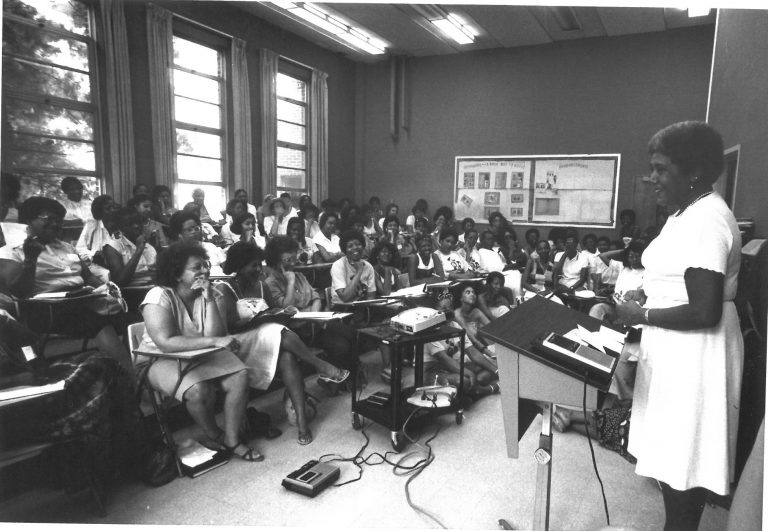SRJ Hub: History
In 1983, a large convening of Black women came together at Spelman College to articulate the specific unmet health care needs of Black women, including in the areas of maternal and infant health. Rooted in personal empowerment and a deep recognition of institutional oppression, these discussions sparked a nationwide ripple effect. Similar dialogues began to emerge in communities across the country, helping to redefine reproductive health through the lens of race, gender, and systemic inequity.
Later, in June 1994, a caucus of twelve Black women calling themselves the Women of African Descent for Reproductive Justice (WADRJ), took out a full-page ad in the Washington Post entitled, “Black Women and Health Care Reform.” It ultimately garnered signatures from 836 Black women. With this seminal ad and the press conference on Capitol Hill that followed, the Reproductive Justice (RJ) Movement was born.
For nearly three decades, RJ has been recognized globally as a critical framework grounded in Black feminist thought and human rights. It is based on the practice of self-help and community care and is inclusive and applicable to everyone. Reproductive Justice is the human right “not to have children using safe birth control, abortion, or abstinence; the right to have children under the conditions we choose; and the right to parent the children we have in safe and healthy environments.” The RJ framework includes the right to bodily autonomy, free from any form of sexual or reproductive oppression. The framework is now more inclusively called Sexual and Reproductive Justice: the “complete physical, mental, spiritual, political, social, and economic well-being of women and girls based on the full achievement and protection of women’s human rights” and all people who can become pregnant.
The goal of SRJ is to advocate for and sustain the human rights of historically marginalized women, families, and communities in the United States and around the world to have the power and resources to maintain autonomy over their sexual and reproductive lives.
SRJ acknowledges the harms of repeated divestment due to structural racism and the resulting inadequate, inequitable access to resources and physical, emotional, spiritual, mental harm. The SRJ framework recognizes that reproductive autonomy is intrinsically linked to the full breadth of social determinants of health and racial equity.
Without equitable access to quality and safe healthcare, housing, education, environments, food, employment, and wages, there cannot be reproductive autonomy.
Learn More from Reproductive Justice Scholars and Advocates
To deepen your understanding of the history and foundations of Reproductive Justice as well as the current impact on diverse populations, explore Radical Reproductive Justice: Foundations, Theory, Practice, Critique—a pivotal resource by Loretta Ross, Lynn Roberts, Erika Derkas, Whitney Peoples, and Pamela Bridgewater Toure.
For a rights-based perspective on environmental health, reproductive justice, and the intergenerational impacts of environmental contamination, read Indigenous Women and Environmental Violence by Carmen Waghiyi, presented at the United Nations Expert Group Meeting.
For insights into Black Queer reproductive experiences, watch Black Queer Being/Knowing/Feeling: Storytelling of Barriers to Reproductive Healthcare, a recorded talk by Robyn Adams, Assistant Professor at Texas Tech University.

